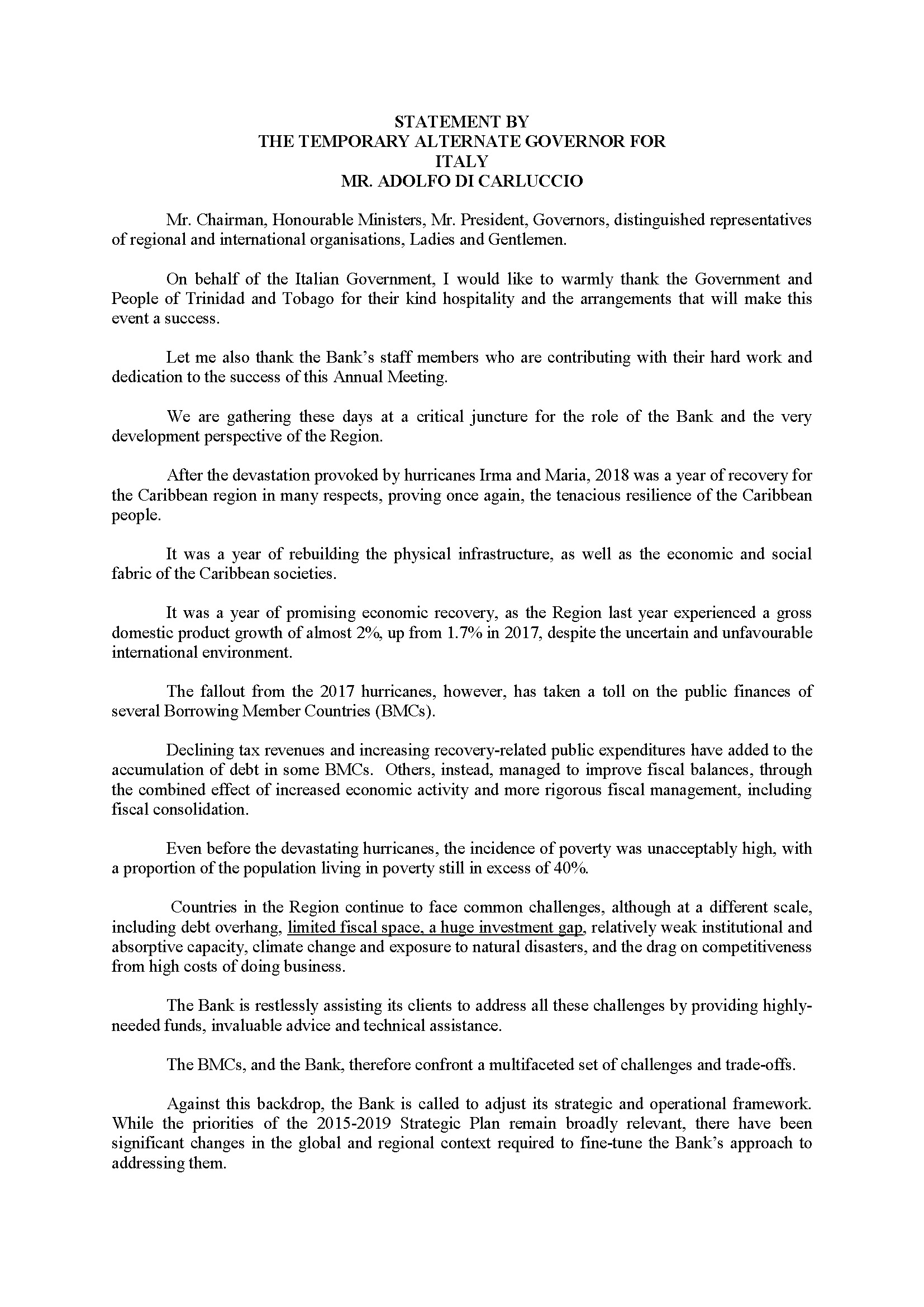
Mr. Chairman, Honourable Ministers, Mr. President, Governors, distinguished representatives of regional and international organisations, Ladies and Gentlemen.
On behalf of the Italian Government, I would like to warmly thank the Government and People of Trinidad and Tobago for their kind hospitality and the arrangements that will make this event a success.
Let me also thank the Bank’s staff members who are contributing with their hard work and dedication to the success of this Annual Meeting.
We are gathering these days at a critical juncture for the role of the Bank and the very development perspective of the Region.
After the devastation provoked by hurricanes Irma and Maria, 2018 was a year of recovery for the Caribbean region in many respects, proving once again, the tenacious resilience of the Caribbean people.
It was a year of rebuilding the physical infrastructure, as well as the economic and social fabric of the Caribbean societies.
It was a year of promising economic recovery, as the Region last year experienced a gross domestic product growth of almost 2%, up from 1.7% in 2017, despite the uncertain and unfavourable international environment.
The fallout from the 2017 hurricanes, however, has taken a toll on the public finances of several Borrowing Member Countries (BMCs).
Declining tax revenues and increasing recovery-related public expenditures have added to the accumulation of debt in some BMCs. Others, instead, managed to improve fiscal balances, through the combined effect of increased economic activity and more rigorous fiscal management, including fiscal consolidation.
Even before the devastating hurricanes, the incidence of poverty was unacceptably high, with a proportion of the population living in poverty still in excess of 40%.
Countries in the Region continue to face common challenges, although at a different scale, including debt overhang, limited fiscal space, a huge investment gap, relatively weak institutional and absorptive capacity, climate change and exposure to natural disasters, and the drag on competitiveness from high costs of doing business.
The Bank is restlessly assisting its clients to address all these challenges by providing highly-needed funds, invaluable advice and technical assistance.
The BMCs, and the Bank, therefore confront a multifaceted set of challenges and trade-offs.
Against this backdrop, the Bank is called to adjust its strategic and operational framework. While the priorities of the 2015-2019 Strategic Plan remain broadly relevant, there have been significant changes in the global and regional context required to fine-tune the Bank’s approach to addressing them.
- First, the international development agenda has evolved and became increasingly more complex, by integrating new facets of the development concept including migration as well as inequality, following disruptions associated with the rapid expansion of new technologies.
- Second, there is a heightened awareness, including among private investors, of the impending threats climate change pose to regional economies, above all those highly dependent on tourism. Increased frequency and intensity of extreme events, rising sea level, acidification and increased coral bleaching are also now considered symptoms of a “climate change risk” that private investors have started to price into their investment decisions. Belize, Haiti, and Jamaica are already considered acutely vulnerable to climate change, and by 2030, several BMCs are expected to be added to that category.
- Third, the international political environment features a mutated posture of public opinion and governments on multilateral cooperation, with the policy focus of some major donor countries possibly turning inwards.
- Fourth, the Venezuelan crisis threatens contagion to the Region and puts at risk, energy security in those BMCs heavily dependent on Venezuela, above all Haiti.
- And last, but not least, there is today, an increased awareness of the critical role that private sector resources must play in addressing development challenges and in particularly in financing infrastructures.
In this latter regard, many BMCs confront the challenge of balancing infrastructure financing needs and the sustainability of public debt.
The estimated infrastructure financing gap in the Region is huge and has serious implications. Persisting shortages in infrastructure financing lead to supply-side bottlenecks, obsolescence of infrastructure services, and vulnerability to extreme weather events.
BMCs are facing at once, budget constraints, a severe infrastructure gap and an investment efficiency gap. They need to invest more and to invest smarter. More resources are needed; and they need to be spent more efficiently and effectively. Involving the private sector must be part of the policy response.
CDB plays an important role in this respect, through helping clients mobilise domestic resources including tax revenues and private financing.
For the Bank to play an even more prominent role, it needs to review its engagement model with the private sector and elevate it to a policy level, through assisting countries to develop local financial markets, promoting a conducive business environment, establishing an efficient and predictable regulatory framework, and introducing a transparent governance of public investments, including on Public-Private Partnerships. In this latter respect in particular, CDB needs to invest in the capacity of the public sector to select, design and carry out investment plans effectively. The Bank needs to “invest in investment”.
The quest for efficiency and effectiveness also concerns CDB.
We commend the Bank for its rigor in containing administrative expenditures and its attention to the efforts being made by many of its members in managing their own domestic budgets.
We support the Bank’s efforts to preserve its credit rating, including through diversifying its portfolio and membership. To this purpose, we invite the institution to renew its efforts to expand its membership at regional and non-regional levels, and to fully exploit the potential of the G20‑endorsed Multilateral Development Banks’ (MDBs) Balance Sheet Optimisation menu.
Through leveraging its convening power and financial capacity, CDB is well positioned to become the key partner of the Caribbean countries and assist them in their socio-economic development efforts. However, CDB cannot do everything and cannot do it alone.
We urge the Bank to continue seeking both financial and operational partnerships with other MDBs and bilateral donor agencies.
CDB needs to promptly respond to an evolving environment by repositioning itself and pursuing new avenues of engagement, above all, through strengthening its policy dialogue and knowledge products. However, repositioning itself also implies selectively reconsidering the Bank’s engagement in areas where the institution does not feature comparative advantages.
Discussions on the Bank’s Strategy also include reviewing its value proposition and the engagement model. The Bank’s value proposition should primarily rely on its capacity to mobilise private and institutional investors, foster domestic resource mobilisation, and deepen local capital markets. It also relies on its capacity to tailor financial and non-financial products to the specific challenges and conditions of each BMC. The increasing trend of the Bank’s lending is a testimony to the appreciation and competitiveness of its financial products.
In this respect, we support a cautious reform of lending products, promoting a targeted and efficient use of concessional resources and fully considering risks, development impact, comparative advantages and division of labour with other International Financial Institutions, including the International Monetary Fund.
With regards to the engagement model, we support the Bank’s ongoing efforts to improve responsiveness to clients and feedback loops. While possibly requiring some adjustments to the centralised operational model, quicker responsiveness to clients should be achieved primarily by leveraging technology and streamlining operational procedures.
We urge the Bank to duly consider all the implications of a massive decentralisation process, above all, its costs and the need to tailor governance and fiduciary safeguards to a decentralised environment.
In concluding, we would like to reiterate Italy’s support to CDB and our trust that this Bank is capable of meeting its goals for the benefit of the Caribbean region.


